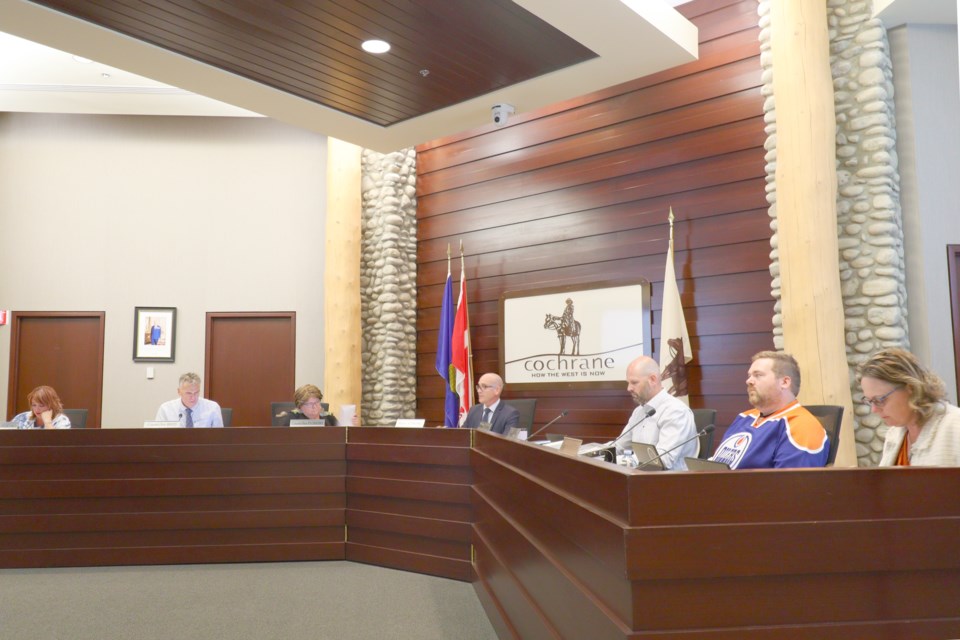With the future of the land parcel at 136 Quigley Drive still undecided, Cochrane residents and members of the FrancoSud school community gathered at the RancheHouse council chambers on June 16 to share their views on the proposed francophone secondary school.
More than 30 speakers took to the podium during the public hearing, with both opponents and supporters voicing their opinions on the controversial proposal.
One of the most prominent concerns raised by residents was traffic congestion and safety.
“Having a third school would negatively affect traffic on Quigley in an unsafe way—for both emergency evacuation possibilities and personal emergencies, where folks may be prevented from easily exiting our three communities,” said resident Norene Procter.
Pam Stephens echoed those concerns, recalling “one child being struck by a vehicle and thankfully suffered only minor injuries.”
“We are lucky this hasn’t been more, she said. “I believe it’s just a matter of time.”
Brandon Mackinnon argued the location is unsuitable because of the inevitable growth schools undergo.
“Schools are not built with short-term goals in mind,” he said. “It would eventually reach capacity. The increased student traffic, buses, and limited field space would make the site very unsuitable for students and for nearby residents.”
FrancoSud, the francophone school division proposing the development, attempted to address these issues throughout the process. Directrice générale (superintendent) Monique Baker assured the public that traffic impacts would be minimal.
“All of our students already have access to transportation,” she said. “They are already being transported to a K–12 school, so there would not be additional traffic.”
However, many residents remained skeptical.
Another key concern was the potential loss of green space. Residents described the field behind École Notre-Dame des Vallées (NDV) as a well-used public amenity.
“It’s a green space used by the community after school hours, on weekends, and all summer,” said Danielle Bacon. “It’s probably used more by the community than the students at NDV themselves.”
Bacon also questioned whether the new facility would truly serve the broader public: “We would be letting go of a free community space and, in return, have to rent their facilities—as we do now with their current building.”
Supporters of the school were equally passionate in their testimony. Briget Breck, a parent committee member for NDV and Les Petites Abeilles, emphasized the urgent need for new school infrastructure.
“The demand for a francophone high school in Cochrane is not theoretical—it is urgent,” she said. “Our current school infrastructure was not designed for the growth we’re seeing.”
Students also stepped up to speak, painting a picture of overcrowding and limited learning space.
“Right now, the current schedule overlaps,” said Grade 6 student Liam DeGuzman. “That basically means high school students could be doing a test or studying while another elementary class is transitioning through the halls.”
Madeline Deglow, in Grade 9, added: “We’re stuck in a small room attached to the kitchen, and we’re constantly disrupted by younger students and staff using it. It’s our only entrance.”
Even the school's two Grade 12 students aren’t spared.
“Since I’m in Grade 12, there’s only two of us,” said André Retallack. “We’re crammed into the old vice-principal’s office. It’s hard to fit two students and a teacher in there.”
Despite all the arguments raised, council gave no clear indication of where they currently stand on the issue. The decision before them is whether or not to issue a letter of endorsement, a necessary step for FrancoSud to move the project forward.
Coun. Alex Reed acknowledged traffic would be a reality if the school is built.
“Why don’t we just accept the fact that it is going to be a problem?” he said. “To suggest otherwise is a fallacy. Every community in Cochrane has faced this. Even if 10 per cent of Alberta high school students drive, we’re still talking about maybe 15 cars, plus additional staff vehicles.”
Questions from councillors about parking and traffic solutions were largely deferred to the development permit stage. As confirmed by Coun. Marni Fedeyko, if the project reaches that stage, it would no longer require council approval.
The proposal is expected to return to council for a decision at its next regular meeting on June 23.




